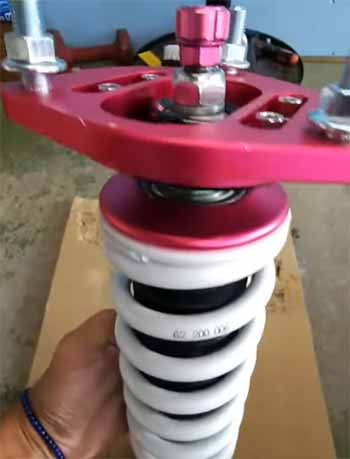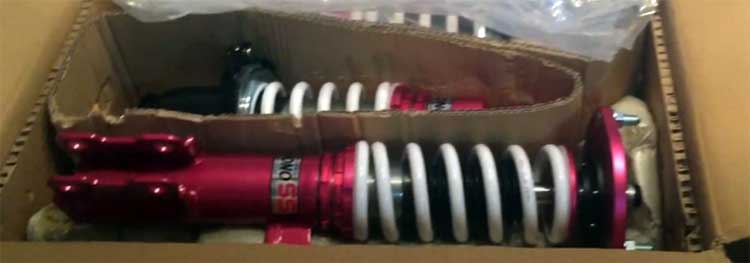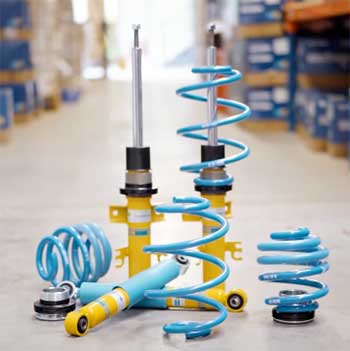I’ve spent years tweaking my car’s suspension, chasing that perfect balance of performance and comfort, and let me tell you, the Godspeed Mono SS coilovers have won me over.
If you’re a car enthusiast on a budget who wants a sporty ride without sacrificing daily drivability, these coilovers are a game-changer. They’re affordable, adjustable, and deliver a surprising punch for the price.
Trust me, after months of testing them on my Mazda 6, I’m convinced they’re worth every penny. Ready to hear why? Let’s get into my experience and break it all down.
My Journey With Godspeed Mono SS Coilovers

Picture this: I’m cruising through the winding backroads near my hometown, the kind of roads that make you grin like a kid when your car hugs every curve.
That’s where the Godspeed Mono SS coilovers first blew me away.
I installed them on my 2014 Mazda 6 about a year ago, and I’ve put them through everything—daily commutes, spirited canyon runs, and even a few autocross sessions. Let me set the scene.
I snagged these coilovers during a killer deal on Amazon for around $650, a steal compared to high-end brands like KW or Bilstein.
Out of the box, they looked sharp—candy cherry red, with clean welds and sturdy components.
Installation took me about three hours in my garage with just a ratchet, some sockets, and a bit of elbow grease.
No power tools, no drama. The instructions were straightforward, and everything lined up perfectly, which isn’t always the case with budget parts.
My first drive was a revelation. I set the dampening to 8 clicks from soft (out of 16) and dropped the ride height about 1.5 inches. The car felt planted, like it was glued to the road, but it didn’t rattle my teeth out over potholes.
I took it to a local autocross event a week later, and the adjustability shone. I stiffened the dampening to 12 clicks, and the Mazda carved through cones like a go-kart. On the highway, I softened them back up, and it rode almost as smoothly as stock.
After 15,000 miles, they’re still holding strong—no leaks, no weird noises. Sure, they’re not perfect, but for the price, they’ve exceeded my expectations. Now, let’s break down what makes these coilovers so good.
Pros of Godspeed Mono SS Coilovers
- Unbeatable Value for the Price

You’re probably thinking, “Cheap coilovers? Sounds like a gamble.”
I get it—I was skeptical too.
But the Mono SS delivers features you’d expect from pricier setups.
Monotube dampers, 16-way adjustability, and KOYO bearing pillow ball mounts?
That’s stuff you find on coilovers costing twice as much. For $650-$750, you’re getting a lot of bang for your buck.
I’ve driven cars with $2,000 setups, and while those are smoother on the track, the Godspeeds hold their own for street driving and occasional performance use.
- Impressive Adjustability
One of my favorite things about these coilovers is how tunable they are. With 16 levels of dampening, you can dial in the ride to match your mood. Want a cushy commute? Go soft, around 4-6 clicks. Craving a track-day beast? Crank it to 12 or higher.
I’ve played with the settings endlessly, and the difference is noticeable. The independent ride height adjustment is a blessing too. I can raise the car for winter snow or slam it for summer cruising without messing with spring preload. It’s like having two cars in one.
- Solid Build Quality
Don’t let the price fool you—these aren’t flimsy eBay knockoffs. The 52mm carbon steel shock bodies feel robust, and the anodized finish has held up against road salt and grime. The polyurethane bushings keep things quieter than spherical bearings, which is a win for daily driving.
After a year of abuse, including some gnarly potholes, I’ve had zero leaks or creaks. Sure, the powder coating chipped slightly on one adjuster knob, but it’s cosmetic and hasn’t affected performance.
- Decent Street and Track Balance
I’ll be honest—I’m not a pro racer, but I love pushing my car on twisty roads and the occasional autocross. The Mono SS strikes a sweet spot. On the street, they’re firm but not punishing, cutting body roll without making you feel every pebble.
At the track, they keep the car composed through high-speed corners. I ran a personal best at a local autocross with these, beating my old time on stock suspension by two seconds. For a budget coilover, that’s impressive.
- Easy Installation
If you’ve got basic mechanical skills, installing these is a breeze. Everything comes pre-assembled, and the included hardware fits like it’s OEM. I had mine on in three hours, and I’m no pro mechanic.
The front camber plates are a nice touch, letting you tweak alignment without extra parts. Just make sure you get an alignment afterward—more on that later.
Not-So-Good Parts of Godspeed Mono SS Coilovers
- Spring Rates Could Be Better
The spring rates—typically 8k front and 10k rear—aren’t ideal for every car. On my Mazda 6, they’re a bit stiff for daily driving, especially on rough roads. You’ll feel bigger bumps more than you would with stock suspension or premium coilovers like Ohlins.
If you’re after pure comfort, you might want to pair these with softer aftermarket springs, but that adds cost and hassle. For performance, the rates are decent, but hardcore track enthusiasts might find them underdamped at higher speeds.
- Limited Track Performance
Speaking of the track, these coilovers aren’t built for hardcore racing. At an autocross event, I pushed them hard, and on full stiff (16 clicks), the rear felt slightly unsettled over mid-corner bumps. A buddy with BC Racing coilovers didn’t have the same issue.
For casual track days, they’re fine, but if you’re chasing lap times or doing endurance racing, you’ll want something with better valving and higher adjustability, like KW V3s or Bilstein PSS10s.
- Minor Fitment Hiccups
While installation was mostly smooth, I ran into a couple of quirks. The brake line bracket slots on the front struts were a hair too small, so I had to bend them slightly to fit the clip.
Also, one rear shock’s height adjustment was stiff out of the box—likely some powder coating in the threads. It took 15 minutes of wrestling to free it up. These aren’t dealbreakers, but they’re worth noting if you’re not patient with DIY installs.
- Rust and Coating Issues
After a year in a salty Northeast winter, I noticed minor surface rust under the powder coating on one rear shock. It’s not structural, but it’s annoying for a relatively new product. The adjuster knobs also showed some chipping, which doesn’t affect function but looks a bit cheap.
Higher-end brands like Tein or KW have better corrosion resistance, so if you live in a harsh climate, you’ll need to keep an eye on maintenance.
- No Rebuild Option
Unlike premium coilovers, the Mono SS aren’t rebuildable. If a damper blows, you’re buying a new set. So far, mine are holding up, but I’ve read horror stories of budget coilovers failing after 20,000 miles.
For casual drivers, this might not be an issue, but if you’re racking up miles or tracking frequently, the lack of rebuildability could be a long-term drawback.
Maintenance Tips For Godspeed Mono SS Coilovers

- Regular Cleaning and Inspection
Your coilovers live a tough life down there, exposed to dirt, salt, and water. I make it a habit to clean mine every month, especially in winter. Use a hose (not a pressure washer) to rinse off grime, focusing on the shock bodies and threads.
After cleaning, I inspect for rust or oil leaks. A quick wipe with a silicone-based lubricant on the threads keeps adjustments smooth. If you spot rust, hit it with some rust converter and touch-up paint to prevent spreading. This takes 20 minutes but can double their lifespan.
- Proper Preload Adjustment
Setting the spring preload correctly is crucial. I learned this the hard way when my car was bouncy after install. The trick is to set preload to about 10mm—enough to keep the spring snug without compressing it too much.
Use a floor jack to take weight off the suspension, then adjust the lower spring perch until the spring is just seated. This prevents rubbing and improves ride quality. Check preload every few months, as it can shift after the springs settle.
- Alignment After Adjustments
Every time you tweak the ride height or camber, get an alignment. I skipped this once and ended up with uneven tire wear and twitchy handling. Most shops charge $80-$100 for a four-wheel alignment, and it’s worth it.
The Mono SS’s camber plates make front adjustments easy, but you might need rear camber arms for some cars. I check my alignment every six months or after major height changes to keep everything dialed in.
- Monitor Dampening Settings
Don’t just set the dampening and forget it. I rotate between softer settings (4-8 clicks) for daily driving and stiffer (10-12 clicks) for performance. Over-tightening to full stiff can wear out the seals faster, so I avoid it unless I’m at the track.
Every few months, I cycle through the settings to ensure the adjusters aren’t seizing. If they feel sticky, a bit of WD-40 and a gentle twist usually fixes it.
- Winter Storage and Protection
If you live in a snowy area like me, winter is brutal on coilovers. Before the first snow, I coat the shock bodies with a corrosion-resistant spray like Fluid Film. If you’re storing your car for the season, raise the ride height to stock levels to reduce stress on the components.
When spring hits, give them a thorough clean and inspection before lowering again. This keeps rust at bay and ensures smooth operation.
Comparison of Godspeed Mono SS Coilover With Other Coilover Brands
I’ve had the chance to drive cars equipped with different coilovers, so let’s see how the Godspeed Mono SS stacks up against Tein Street Advance Z, Bilstein B14, and Five8 coilovers. I’m keeping it real, comparing them based on my experiences and chats with buddies who run these setups.
Each brand has its strengths, but here’s how they measure up in key areas.
- Godspeed Mono SS Vs. Tein Street Advance Z

Tein Street Advance Z coilovers, priced around $800-$1,000, are a popular pick for street-driven cars.
I rode in a friend’s Honda Civic with these, and they’re noticeably smoother over rough pavement compared to my Godspeed Mono SS on my Mazda 6.
The Teins use a twin-tube design, which soaks up bumps better, making them a tad more comfortable for daily driving.
Their 16-way dampening feels refined, with softer settings that don’t sacrifice too much sportiness.
However, the Godspeeds are monotube, so they handle heat better during spirited drives, like my autocross sessions, where the Teins started to fade slightly after a few hot laps.
The Mono SS also costs $150-$350 less, and their independent ride height adjustment is just as flexible.
For street comfort, Teins take a slight lead, but Godspeed’s value and track capability make them a stronger all-rounder for budget builds.
- Godspeed Mono SS Vs. Bilstein B14

Bilstein B14 coilovers, retailing at $1,200-$1,500, are a premium option I tested on a BMW E46.
These things are smooth as butter, with a 10-way adjustable dampening system that feels more precise than the Godspeed’s 16-way setup.
The Bilsteins use monotube dampers like the Mono SS, but their valving is top-notch, offering a plush ride on the street and razor-sharp handling on the track.
I noticed less body roll and better high-speed stability compared to my Mazda on Godspeeds.
However, the B14s are nearly double the price, and for casual enthusiasts like me, the performance gap isn’t always worth it.
The Godspeeds match them closely for street driving and light track use, with camber plates included (Bilstein charges extra for those).
If you’ve got the cash and crave perfection, Bilstein’s quality shines, but the Mono SS delivers 80% of that experience for half the cost.
- Godspeed Mono SS Vs. Five8 Coilovers

Five8 coilovers, priced around $700-$900, are another budget contender I’ve seen on a friend’s Subaru WRX. They’re similar to the Godspeed Mono SS in price and monotube design, but I found their build quality a step below.
The Five8s had a slightly harsher ride, even on softer settings, and the dampening adjustments felt less consistent—jumpy between clicks compared to the linear feel of the Mono SS. My friend also dealt with a seized adjuster knob after a year, something I haven’t had with my Godspeeds (just minor chipping).
Five8 offers decent handling for the price, but the Godspeeds edge out with better adjustability and included camber plates, which Five8 skips on some models. If you’re choosing between these two, the Mono SS feels more polished and versatile for both street and occasional track days.
Also Read: Is TruHart Coilover Worth It?
Frequently Asked Questions (FAQ)
You bet they are, especially for the price. I’ve been running them for over a year, and they’ve transformed my Mazda 6 into a corner-carving machine without killing my daily commute. They’re not perfect—rough roads can feel a bit harsh, and they’re not built for pro-level track work—but for street driving and occasional autocross, they’re a solid choice. The 16-way dampening and sturdy monotube design give you a lot of flexibility for under $800. If you’re on a budget, they’re a no-brainer.
Godspeed Mono SS coilovers are manufactured in Taiwan, not China, which gives them a slight edge in quality control over some other budget brands. I’ve read mixed things online, but my set has held up well, with no signs of cheap craftsmanship. The KOYO bearings and high-viscosity race oil are legit components, and the overall build feels solid. Taiwan’s got a decent rep for producing reliable aftermarket parts, and my experience backs that up.
These coilovers replace your car’s stock suspension, letting you adjust ride height and dampening to suit your driving style. Want to lower your car for that aggressive stance? You can drop it a couple of inches. Need better handling for twisty roads? Crank up the dampening. They reduce body roll, improve cornering grip, and give you a sportier feel. On my Mazda, they cut body roll dramatically and made the car feel alive without sacrificing too much comfort.
It’s tough to pin down exact lifespans, but premium brands like Bilstein, KW, or Ohlins typically last the longest—often 50,000+ miles with proper maintenance—because they’re rebuildable. My Godspeed Mono SS coilovers have 15,000 miles and are still solid, but they’re not rebuildable, so you might need to replace them if a damper fails. For budget options, Godspeed and BC Racing seem to outlast brands like Megan or Raceland, especially if you maintain them well. Regular cleaning and proper preload are key.
Why Godspeed Mono SS Coilovers Are My Go-To?
After a year of living with the Godspeed Mono SS coilovers, I’m still impressed. They’ve given my Mazda 6 a new lease on life, blending performance and affordability in a way I didn’t think was possible.
From easy installs to tunable handling, they’re perfect for enthusiasts who want to spice up their ride without breaking the bank. If you’re ready to take your car to the next level, give these a shot—you won’t be disappointed.

